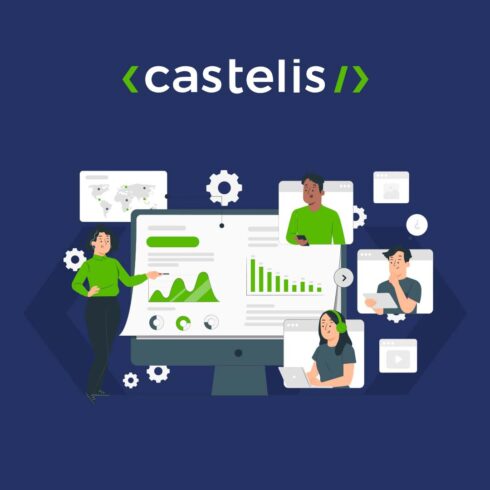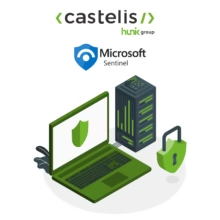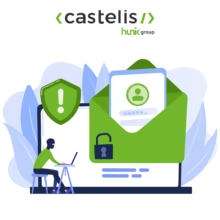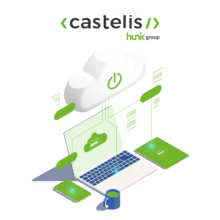
ERP : How to choose an ERP for your company ?
Choosing the right ERP is a major strategic decision governing the life of a company. ERP (Enterprise Resource Planning) is a tool that allows you to manage your company. It generally uses one or more databases to make the most of the data in the company’s possession. Thanks to its powerful technology, ERP is an interesting option for companies that wish to optimize their operational organization. This solution is particularly effective in increasing the autonomy and productivity of employees. What are the essential criteria for choosing an ERP ? Which are the most efficient ERPs on the market ? How to choose between a standard ERP or a custom-made management software ?
Discover the main features and benefits of the software as well as the best ERPs to improve your management.
6 criteria to choose for an optimal ERP
1/ Reporting
The primary goal of an ERP adapted to your needs is to benefit from measured data for a better management of your activity. Data collection is only reliable if it is regular or in real time. The management software adapted to the real needs of your organization allows the easy collection of information by your employees at any level of the company.
2/ To be able to integrate its external tools with the ERP
The role of an ERP is above all to simplify your processes.
Selecting an ERP that does not integrate your external tools means having to work with multiple independent databases. However, opting for a software package that aggregates data from your various business applications represents an invaluable time-saver for your employees, who will no longer have to enter the same data in several tools. The ERP allows a homogenization of the company’s information system, data shared between departments, better visibility on projects, production, planning…
3/ The presence of essential features
To be profitable, a company needs to run its business according to a coherent and fluid process. In order for teams to move forward in a synchronized manner, a high-performance ERP system must include functionalities related to a company’s core businesses : sales, marketing, customer service, production, human resources and financial management.
Depending on the needs, it can be more or less complete from one department to another, or it can work with complementary tools to offer a technological environment that meets all the needs.
4/ The choice of ERP hosting
Depending on financial or performance criteria, the choice of ERP hosting is important : ERP On premise or Saas.
A Saas (Software as a service) tool, which is managed outside the company, provides more security and generally greater continuity of service than an on-premise ERP. SaaS will provide access to customized software with cloud hosting (not on site), which eliminates the need for maintenance and repair.
Opting for an on-premise ERP allows the organization to acquire the ERP for an indefinite period of time. The advantage of this is that you do not have to pay a subscription fee, as is the case with the SaaS model. However, on-premise hosting requires technical resources to maintain and administer the infrastructure.
Beyond these classic schemes, there are alternatives that allow you to free yourself from the constraints of both. For example, Castelis is the creator of the software of management for joint consultative committee, Logi-CE. It is hosted on the Cloud, custom designed for each company, but exempts them from a recurring subscription. Its maintenance and availability are ensured by our team.
5/ Time to deployment and adoption in the enterprise
Implementing an ERP system in a company involves an incompressible deployment time. Depending on the complexity of the functionalities to be integrated, the time required to adopt the tool internally may vary. For this reason, it is interesting to carry out an audit beforehand in order to take into account all your needs and to help you move forward with a solution adapted to your real objectives. Therefore, choose an editor who will accompany you in the elaboration of the specifications, the deployment of your tool and the training of your teams.
6/ The quality of the technical support
As nothing is infallible, your ERP, like any other technological solution, can become momentarily unavailable and paralyze your organization.
For a company’s profitability, planning for ERP maintenance is an investment that ensures proper IT operation. Integrating a management software that benefits from a reliable and efficient technical support is essential.
Choose a solution with a long-term support, a maintenance service available and attentive, with a secure hosting of your data.
Another criterion of choice can be a hotline available to answer the problems and questions of users, allowing the company to use the ERP features correctly. A good technical support is not only useful in case of technical problems: it is also useful to accompany the employees in the handling of the functionalities, to train the teams.
Before contacting the external hotline, you can identify the employees in your company who have a good command of your ERP, thanks to their specific knowledge of your environment and the training they have received. They are the best contacts for your specific needs for all your employees.
Choisir l’ERP le plus adapté aux besoins de son entreprise
A reference management software in its sector of activity
Each sector of activity has distinct needs in terms of managed services. A company in the industrial sector will be looking for an ERP adapted to its own challenges, such as the need for fluidity in production, inventory or warehouse management. On the other hand, a service company will choose an ERP adapted to its business issues such as project management, invoicing, or customer relations. For this last case, involving precise management of employees, a complex invoicing model or significant document management, an ERP for business management such as Chronos is the assurance of a more efficient management.
Since each company profile is unique, your ERP must be designed and configured according to your real needs. Your ERP is chosen not only for your current needs but also for your future needs. The ERP must therefore accompany the growth of your company and not become a brake caused by too strict management rules.
A flexible ERP, able to follow the growth of your company
The life of a company is eventful. Acquisitions, fund raising, increase in sales, development of business areas, increase in the number of employees… The sources of growth are multiple and inevitably affect its functioning, the processes in place. Choose an ERP that adapts to the company’s evolution is a guarantee of serenity and reliability in times when no mistake is allowed.
A tool including specific needs (production, turnover)
Since each company has its own needs, choosing an ERP that adopts its logic is imperative.
Thus, the choice is often delicate for service companies, for which the options on the market remain limited. Choosing an ERP that focuses on business management makes more sense than choosing software that meets basic production management needs. An ERP that encompasses the missions and real issues faced by employees will be more aligned with their daily concerns.
Support for change
Your ERP is not just a tool. It is a real partner in your economic growth, in the evolution of your company and in the comfort of your work, thus playing on the satisfaction of your employees.
Choosing an ERP that adapts to change will allow you to face your new challenges without any surprise effect and without having to change the tool along the way.
Standard ERP or customized ERP, how to choose ?
The standard ERP is a tool designed for the basic needs of a company. It is developed according to generic criteria, usually including traditional modules dedicated to accounting, marketing or invoicing. Even if it is efficient in its field, it is somewhat frozen in time. Standard ERPs do not include any real possibility of adaptation, whereas the life of a company is not always linear…
This is why software publishers are now offering more customized solutions. Solutions that adapt to the real problems and evolutions of a company. With specific business lines and specialized functionalities, the custom ERP allows both a better adaptability of the tool and a certain freedom in its configuration.
The main standard ERPs on the market
Here are the popular “off-the-shelf” ERPs you can find on the market that have proven themselves in their environment:
Oracle Netsuite: used by more than 20,000 companies, the software is completely customizable and adapted to the evolution of a growing business. All the essential functionalities are gathered to make this solution a powerful and complete tool.
SAP: its ERP is particularly well suited to VSEs and SMEs. The European leader offers a tool that allows you to manage finance, human resources, sales and production in a single application.
Sage 300: aimed at medium-sized companies, Sage offers them a powerful software capable of managing invoicing, stock management and commercial estimates. A bit complex to learn, it has many features.
Customized ERP, the ultimate in management software
If the standard ERP has certain limitations, a customized solution allows you to develop your tool with greater flexibility. An ERP editor can thus develop a custom application integrating standard modules or, on the contrary, a solution 100% adapted to the specific needs of a company.
There are therefore a few solutions that allow you to obtain a customized ERP. They are adapted to your business needs and to your specific environment. We will find the following tools:
Cegid: a cloud-based solution, this French ERP is designed for accounting, human resources and finance. The tool handles all operations related to the functioning of SMEs thanks to its business-oriented functionalities.
Chronos GA : ERP for service companies, the tool is dedicated to business management. The software is a particularly effective solution for saving employees’ time while covering all the requirements related to the business and the specificities of each company.
Logi CE: is a platform for social and economic committees allowing them to integrate a complete management of their activities. It can be used for budgetary and accounting follow-up.
Choosing the right ERP system allows companies to remain competitive. Thanks to accessible support and real-time information sharing, a good ERP simplifies both management and internal communication. Whether it is an accounting, commercial or financial process, the tool allows to coordinate all the services of a company to optimize its functioning.
This is why integrating an ERP is a decisive step in the life of a company. With its Chronos GA business management ERP, Castelis offers a solution adapted to service companies that wish to integrate a flexible and efficient tool. Beyond this turnkey solution, our specific development teams work daily on develop ERP, software and custom business applications. Do not hesitate to ask us for advice adapted to your environment and your specific needs.
Need more information or specific support? Contact us, the ERP and custom development experts at Castelis are at your disposal.
Voir plus de Actualités

Why Microsoft Sentinel is Essential for Cyber Threat Management: A Practical Guide for CIOs

Top best practices to improve email security with DMARC

Cloudflare Zaraz Guide: Manage your third-party scripts at the Edge for better web performance
